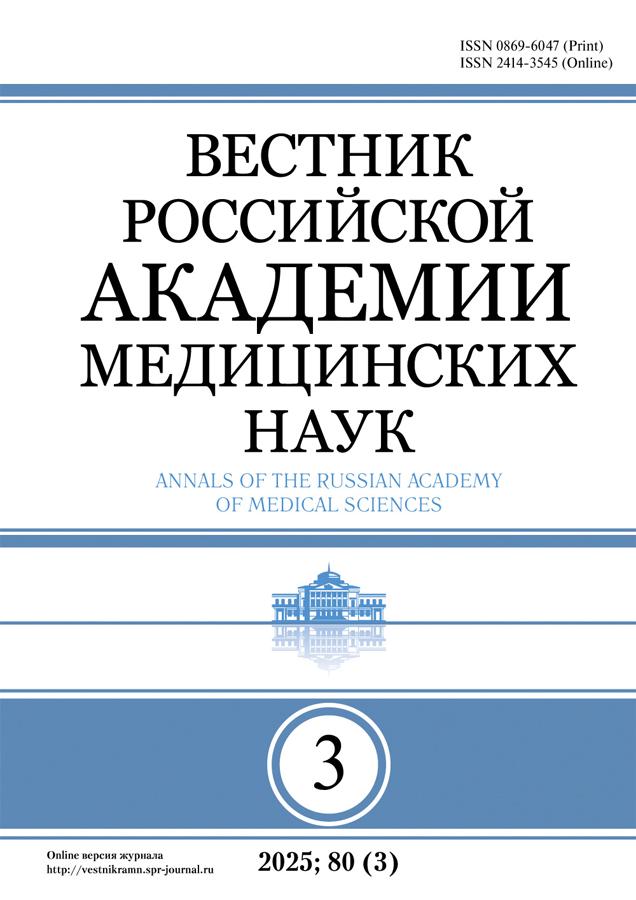НАТРИЙУРЕТИЧЕСКИЕ ПЕПТИДЫ СЕРДЦА И АРТЕРИАЛЬНАЯ ГИПЕРТЕНЗИЯ: ЭКСПЕРИМЕНТАЛЬНОЕ ИССЛЕДОВАНИЕ
- Авторы: Максимов В.Ф.1, Коростышевская И.М.1, Маркель А.Л.2, Филюшина Е.Е.1, Якобсон Г.С.1
-
Учреждения:
- НИИ физиологии Сибирского отделения РАМН, Новосибирск, Российская Федерация
- Институт цитологии и генетики Сибирского отделения РАН, Новосибирск, Российская Федерация
- Выпуск: Том 68, № 1 (2013)
- Страницы: 4-9
- Раздел: АКТУАЛЬНЫЕ ВОПРОСЫ КАРДИОЛОГИИ
- Дата публикации:
- URL: https://vestnikramn.spr-journal.ru/jour/article/view/218
- DOI: https://doi.org/10.15690/vramn.v68i1.531
- ID: 218
Цитировать
Полный текст
Аннотация
Особенности секреции сердечных натрийуретических пептидов изучали на модели гипертонической болезни у крыс с наследственной индуцированной стрессом артериальной гипертензией по ходу онтогенеза (линии НИСАГ). Ультраструктурные качественные и количественные исследования миокарда правого предсердия показали, что активность синтеза и секреции сердечных гормонов у крыс линии НИСАГ выше, чем у нормотензивных одновозрастных животных. Секреторная гиперактивность предсердных миоцитов у крыс линии НИСАГ на ранних этапах онтогенеза предшествует проявлению наследственной гипертензии. Натрийуретические пептиды служат гипотензивным контуром в регуляции гемодинамики на всех этапах онтогенеза и дополнительным к другим гормональным системам регуляторным звеном формирования гипертензии.
Ключевые слова
Об авторах
В. Ф. Максимов
НИИ физиологии Сибирского отделения РАМН, Новосибирск, Российская Федерация
Автор, ответственный за переписку.
Email: kor@physiol.ru
PhD, Chief Research Scientist of Research Institute of Physiology Siberian Branch of the Russian Academy of Medical Sciences
Address: 630117, Moscow, Timakov st., 4, tel.: (383) 334-89-70
И. М. Коростышевская
НИИ физиологии Сибирского отделения РАМН, Новосибирск, Российская Федерация
Email: kor@physiol.ru
PhD, Leading Research Scientist of Research Institute of Physiology Siberian Branch of the Russian Academy of Medical Sciences
Address: 630117, Moscow, Timakov st., 4, tel.: (383) 334-89-70 Россия
А. Л. Маркель
Институт цитологии и генетики Сибирского отделения РАН, Новосибирск, Российская Федерация
Email: markel@bionet.nsc.ru
D.Biol.Sc., Chief Research Scientist of Institute of Cytology and Genetics Siberian Branch of the Russian Academy of Medical Sciences
Address: 630090, Novosibirsk, Lavrentiev avenue, 10, tel.: (383) 363-49-35
Е. Е. Филюшина
НИИ физиологии Сибирского отделения РАМН, Новосибирск, Российская Федерация
Email: eefil@physiol.ru
PhD, Leading Research Scientist of Research Institute of Physiology Siberian Branch of the Russian Academy of Medical Sciences
Address: 630117, Moscow, Timakov st. 4, tel.: (383) 334-89-61 Россия
Г. С. Якобсон
НИИ физиологии Сибирского отделения РАМН, Новосибирск, Российская Федерация
Email: jakobsongs@ngs.ru
Academician of the Russian Academy of Medical Science, Сhief Research Scientist of Research Institute of Physiology Siberian Branch of the Russian Academy of Medical Sciences
Address: 630117, Novosibirsk, Timakov st. 4, tel.: (383) 334-89-61
Список литературы
- de Bold A.J., Bruneau B.G., de Bold M.L. Mechanical and neuroendocrine regulation of the endocrine heart. Cardiovasc. Res. 1996; 31: 7–18.
- D`Souza S.P., Davis M., Baxter G.F. Autocrine and paracrine actions of natriuretic peptides in the heart. Pharmacol. Ther. 2004; 101 (2): 113–129.
- Clerico A., Ry S.D, Giannessi D. Measurement of cardiac natriuretic hormones (atrial natriuretic peptide, brain natriuretic peptide, and related peptides) in clinical practice: the need for a new generation of immunoassay methods. Clin. Chemistry. 2000; 46: 1529–1534.
- Maksimov V.F., Korostyshevskaya I.M. Hormonal system of the heart as a link in the regulation of hemodynamics and water-salt homeostasis. Ross. fiziol. zhurn. im. I.M. Sechenova = I.M. Sechenov Russian physiological journal. 2011; 97 (3): 263–275.
- Korostyshevskaya I.M., Maksimov V.F. Where and when in the heart of natriuretic peptides are secreted. Ontogenez = Ontogeny. 2012; 43 (3): 217–228.
- Markel' A.L. Genetic model of stress-induced hypertension. Izv. AN SSSR. Ser. biol. = Annals of USSR Academy of Sciences. Edition Biology. 1985; 3: 466–469.
- Maslova L.N., Shishkina G.N., Bulygina V.V. et al. Brain catecholamines and hypothalamohypophysial and adrenocortical system with hereditary hypertension. Ross. fiziol. zhurn. im. I.M. Sechenova = I.M. Sechenov Russian physiological journal. 1996; 82 (4): 30–38.
- Shmerling M.D., Buzueva I.I., Korostyshevskaya I.M. et al. Stereomorfometricheskoe study of target organs in rats with genetic hypertension in different periods of postnatal ontogenesis feeding conditions change. Morfologiya = Morphology. 2005; 128 (4): 85–90.
- Kawakami H., Okayama H., Hamada M. et al. Alteration of atrial natriuretic peptide and brain natriuretic peptide gene expression associated with progression and regression of cardiac hypertrophy in renovascular hypertensive rats. Clin. Sci. 1996; 90: 197–204.
- Clerico A., Emdin M. Diagnostic accuracy and prognostic relevance of the measurement of cardiac natriuretic peptides: a rewien. Clin. Chem. 2004; 50: 33–50.
- Goetze J.P. Biosynthesis of cardiac natriuretic peptides. Results Probl. Cell Differ. 2010; 50: 97–120.
- Qing G., Garcia R. Characterisation of plasma and tissue atrial natriuretic factor during development of moderate high output heart failure in the rat. Cardiovasc. Res. 1993; 27 (3): 464–470.
- Goetze J.P., Kastrup J., Rehfeld J.F. The paradox of increased natriuretic hormones in congestive heart failure patients: does the endocrine heart also fail in heart failure? Eur. Heart. J. 2003; 24: 1471–1472.
- Vesely D.L. Discovery of new cardiovascular hormones for the treatment of congestive heart failure. Cardiovasc. Hematol. Disord. Targets. 2007; 7 (1): 47–62.
- Ogawa T., Vatta M., Bruneau B.G. et al. Characterization of natriuretic peptide production by adult heart atria. Am. J. Physiol. Heart. Circ. Physiol. 1999; 276 (Issue 6): 1977–1986.
- Cameron V.A., Ellmers L.J. Minireview: natriuretic peptides during development of the fetal heart and circulation. Endocrinology. 2003; 144 (6): 2191–2194.
Дополнительные файлы








